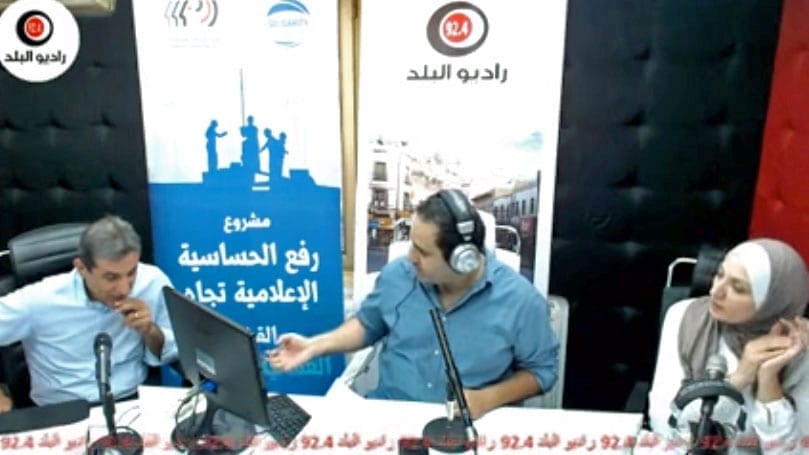
Sep 26, 2019
Callers to a recent radio show about taxi workers in Jordan had many questions, including:
- Why are taxi drivers classified as independent contractors rather than as employees who are eligible for better wages and benefits?
- Why do Jordan’s laws prohibit taxi drivers from joining the country’s transport workers union?
The worker-centered radio show, Workers of the Country (عمال البلد), launched in July by the Federation of Independent Trade Unions of Jordan (FITU), offers the audience an opportunity to hear worker struggles and connects workers with the union—several callers to the August program asked how they could join FITU.
Hosted by Mohammad Al Ersan, in cooperation with FITU President Suleiman Al Jamani, the show has featured union activists and experts on domestic worker rights, labor law and sexual harassment and gender-based violence at work. Peppered with clips from worker rallies and opportunities for the audience to engage with speakers, the show offers a rare look at the day-to-day lives of working people and their efforts to improve their lives and livelihoods.
The segment on taxi drivers highlighted the drivers’ challenges in making a living, a struggle they share with “gig workers” and those in the informal economy around the world. As “self-employed” workers, the nearly 70,000 taxi drivers are excluded from labor laws, and so have no contract, paid leave, retirement or other social protections, Al Seryani said on the show. To make enough to get by, they work long shifts, up to 18 hours per day, which endangers drivers and passengers, he said, and they have suffered for decades without fundamental labor rights.
A union member who called in reinforced Al Seryani, saying the union was established because of the oppression the drivers face, and Manasour Murad, a member of Parliament who also called in said the Ministry of Transport lacks the strategic planning necessary to provide efficient transportation services, including the ability to improve drivers’ working conditions.
Workers’ Struggles, Union Support
In bringing workers’ struggles to the forefront, the 50-minute program probes issues rarely highlighted in the mainstream media yet which are fundamental to the country’s economy and the working people who build it. Fundamental to the discussions are the ways in which unions enable workers to achieve a voice in improving their workplaces and standing up for their rights.
For instance, in exploring sexual harassment and other forms of gender-based violence (GBVH) at work during the show’s second segment, guests highlighted the role of unions in defending workers who experience GBVH on the job and how unions are a resource for assisting workers in reporting abuse while preventing retaliation for standing up for the right to a violence-free workplace. Wijdan Abu Ghanam, leader of the FITU women’s committee, Reema Khaled, an agriculture union activist, and Reem Aslan, a working women’s rights activist and founding member of the Association Sadaqa, a Jordanian women’s rights association, took part in the discussion.
In an another program, Salem Al Mefleh, a lawyer in Jordan, discussed migrant domestic worker rights and the difficulty in enforcing laws to protect them. The segment also featured Hayel Al Zenen, director of the country’s domestic worker directorate, and a domestic worker activist from Ethiopia who discussed how migrant domestic workers in Jordan often labor 24 hours with little food and no leave. Some employers refuse to let them leave the house and never even pay their wages, according to the activist, who asked to remain anonymous to protect her job.
With an estimated 440,000 to 540,000 migrant workers in a country with fewer than 10 million people, migrant workers are an essential part of the economy yet have few rights under labor laws, including the ability to form unions—a situation all-too often replicated across Gulf countries and around the world.
Meeting the Challenges of Restrictive New Labor Laws
The country’s newly amended labor code was the focus of an early segment and an issue discussed throughout the shows. Signed into law in May, the amendments restrict workers’ fundamental rights to freedom of association and collective bargaining and fail to address long-standing limitations on worker rights in Jordan, according to the International Trade Union Confederation (ITUC).
The labor law also now makes it easier for employers to arbitrarily fire workers, says attorney and women’s rights activist Hala Ahed, who joined Hamada Abu Nijmeh, director of the Worker Center, in a discussion on the new labor codes. Further, independent unions like FITU are now unable to register as unions under the labor law.
Despite the challenges, Al Seryani says that as an independent union, FITU has achieved significant victories for workers in improving wages and working conditions, a message the country’s new worker-centered radio program is conveying each week through the voices of workers themselves.
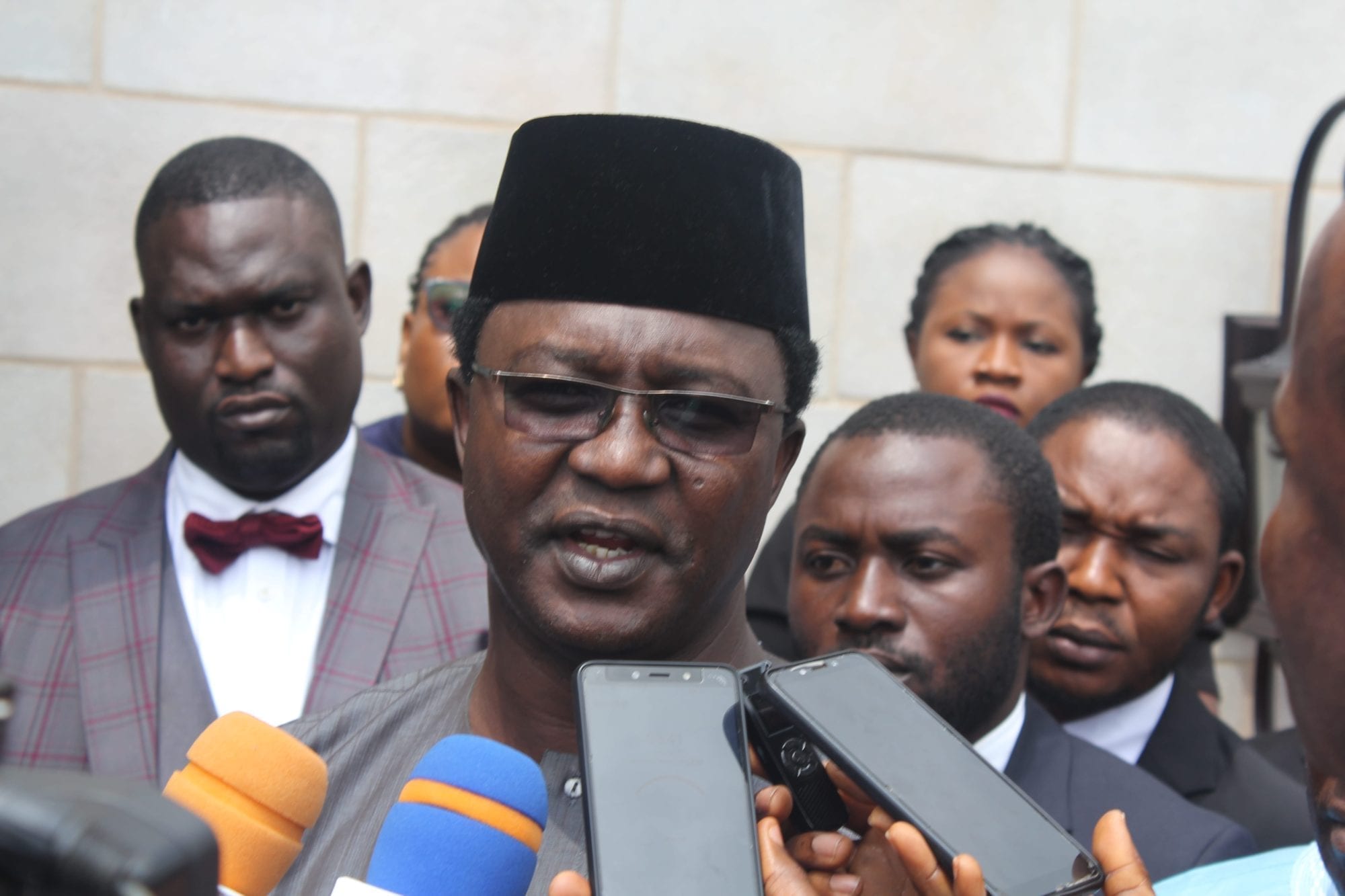
Sep 5, 2019
The Nigerian Labor Congress (NLC) hosted the founding of the Nigeria chapter of the International Lawyers Assisting Workers Network (ILAW) this week. The event was part of the nationwide union’s efforts to strengthen global ties to advance worker rights. More than 20 legal practitioners and scholars attended the event and are among ILAW’s newest members.
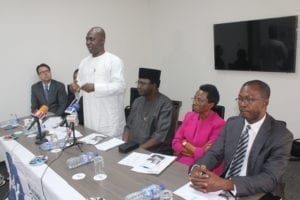
The Nigerian Labor Congress hosted the founding of the Nigeria chapter of ILAW this week. Credit: Moses Umaru, NLC
Speaking at a press conference in Abuja to announce the partnership, NLC President Ayuba Wabba said ILAW will provide an opportunity for lawyers in the country to connect directly with the International Labor Organization (ILO) and with labor lawyers around the world. “The whole essence of working in synergy is to continue to provide for the interest of workers, and defend human rights,” he said.
ILAW, a project of the Solidarity Center, now includes nearly 300 members from more than 50 countries. Launched last November, ILAW seeks to bring together legal practitioners and scholars to best represent the rights and interests of workers and their organizations and effectively advocate for workers in a global working environment. The ILAW Network is supported by an advisory board, comprised of 20 lawyers from 20 countries, with expertise on a broad range of legal matters.
In Nigeria, where jobs increasingly are contracted out and workers are forced into low-paying, insecure informal economy work, Wabba sees ILAW as another tool for strengthening the labor movement by coordinating efforts to counter the anti-worker moves by employers.
The challenges workers face in Nigeria are similar to those around the world—making collaboration of lawyers in multiple legal jurisdictions essential, says Jeff Vogt, Solidarity Center rule of law director and ILAW board chair.
“ILAW will always stand for, and protect the rights of workers and trade unions across the globe and in Nigeria,” says Vogt.
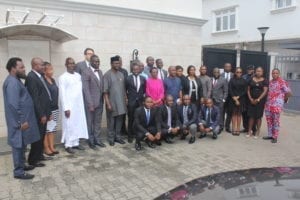
More than 20 legal practitioners and scholars took part in launching the country’s ILAW chapter. Credit: Moses Umaru, NLC
The Federal Capital Territory chapter of the Nigerian Bar Association also welcomed the partnership. “As an association of lawyers in Nigeria, we want to be part of this network,” said attorney Emmanuel Adedeyi.
In short, said Wabba, the partnership with ILAW means that “when you are in the courtroom as lawyers, we will also be on the street to compliment what you are doing in the courtroom—and that is the whole essence of us working together.”
ILAW membership includes access to legal resources and worker rights lawyers around the world. Find out more.
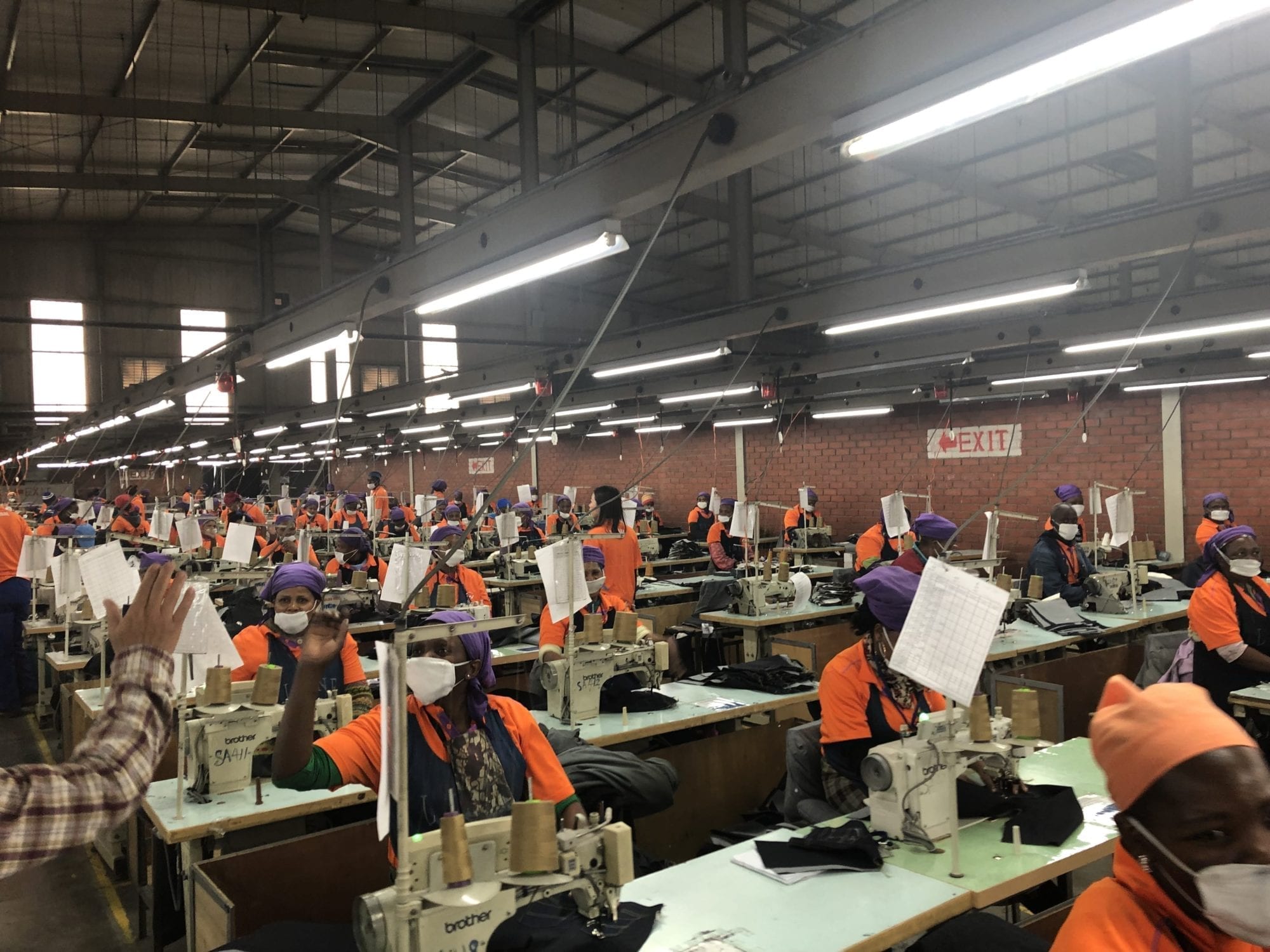
Aug 15, 2019
Leading apparel brands, trade unions and women’s rights organizations sign binding agreements to combat gender-based violence and harassment at key supplier’s factories in Lesotho
With support from U.S. labor organizations, collaborative program creates independent mechanism to investigate complaints and enforce remedies
Maseru, Lesotho; Washington, D.C. (August 15, 2019): Civil society groups, an international apparel manufacturer, and three global brands have agreed to launch a comprehensive pilot program intended to prevent gender-based violence and harassment (GBVH) in garment factories in Lesotho employing more than 10,000 workers.
Five Lesotho-based trade unions and women’s rights organizations, as well as U.S.-based Worker Rights Consortium, Solidarity Center and Workers United, have signed a set of unprecedented agreements with Nien Hsing Textile and Levi Strauss & Co., The Children’s Place, and Kontoor Brands to address GBVH at five factories owned and operated by Nien Hsing Textile in Lesotho.
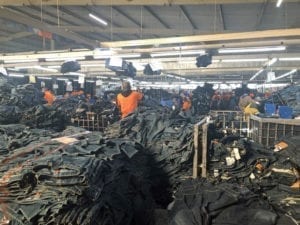
Garment workers in Lesotho make jeans for global export, including to the United States. Credit: Solidarity Center/Shawna Bader-Blau
The product of extensive negotiations after a Worker Rights Consortium investigation documented a deeply concerning pattern of abuse and harassment in Nien Hsing Textile factories in the country, the agreements reflect a shared commitment to protect the rights of workers, support economic development in Lesotho, and promote Lesotho as an apparel exporting country.
The unions and women’s rights organizations are Independent Democratic Union of Lesotho (IDUL), United Textile Employees (UNITE), the National Clothing Textile and Allied Workers Union (NACTWU), the Federation of Women Lawyers in Lesotho (FIDA) and Women and Law in Southern African Research and Education Trust-Lesotho (WLSA). Each brand agreement will operate in tandem with a separate agreement among Nien Hsing Textile and the trade unions and women’s rights organizations to establish an independent investigative organization to receive complaints of GBVH from workers, carry out investigations and assessments, identify violations of a jointly developed code of conduct and direct and enforce remedies in accordance with the Lesotho law. The program will also involve extensive worker-to-worker and management training, education, and related activities.
The Solidarity Center, Worker Rights Consortium and Workers United will provide technical and administrative assistance and support for the program.
“We are grateful to everyone for their input and ideas over the past several months, which allowed us to reach an agreement that should benefit and protect people – and women in particular – who are so important to the work we and our brand customers do,” said Richard Chen, chairman of Nien Hsing. “We strive to ensure a safe and secure workplace for all workers in our factories and are therefore fully committed to implementing this agreement immediately, comprehensively, and with measurable success.”
Attendant to the agreements, the brands and the local organizations agreed to appoint representatives to serve on an Oversight Committee for the program, with equal voting power. Nien Hsing Textile and the Worker Rights Consortium will each have observer status on the Oversight Committee.
Funding for the two-year program will come primarily from the three brands, in collaboration with the U.S. Agency for International Development (USAID) in an inspiring and innovative public-private partnership.
Levi Strauss & Co., The Children’s Place and Kontoor Brands jointly stated, “We are committed to working to protect workers’ rights and foster well-being at third party supplier factories, so that all workers at these facilities, especially female workers, feel safe, valued and empowered. We are pleased to be collaborating with Nien Hsing Textile, the Worker Rights Consortium, the Solidarity Center, and local trade unions and women’s advocacy groups in Lesotho on a comprehensive program intended to prevent and combat gender-based violence and harassment in the workplace. We believe this multi-faceted program can create lasting change and better working environments at these factories, making a significant positive impact on the entire workforce.”
Nien Hsing Textile has committed to work with the Solidarity Center and partner organizations to ensure that effective policies and systems to address GBVH are established at its facilities. In addition, Nien Hsing Textile will provide access to its factories for reporting purposes and direct its managers to refrain from any retaliation against workers bringing complaints or otherwise participating in the program. Should there be any material breach by Nien Hsing Textile of its agreements with the trade unions and women’s rights organizations, each brand has committed to reduce production orders until Nien Hsing returns to compliance.
“FIDA and WLSA are pleased and thankful for the support extended to the NGOs and trade unions by the three brands, Levi Strauss & Co., The Children’s Place, and Kontoor Brands, for the program to prevent and eliminate gender-based violence and harassment directed at women employees in the textile sector in Lesotho,” Thusoana Ntlama and Libakiso Matlho, of FIDA and WLSA, respectively, said. “This is the first initiative in Lesotho that brings together workers, unions, women’s organizations and employers to work towards one common goal of improving the socio-economic rights of women in the workplace.”
“These breakthrough agreements set an example for the rest of the apparel industry on how to address harassment and abuse in apparel supply chains,” said Rola Abimourched, senior program director at the Worker Rights Consortium. “The parties worked together to develop a series of binding agreements between Nien Hsing, its brand customers, and unions and women’s organizations, that guarantee protection for workers and punishment for harassers. Hopefully this is something others will see and build on, so we can collectively make an impact far beyond any single country.”
Appendix:
Background on unions and NGOs involved (with contact information)
About the Federation of Women Lawyers in Lesotho (FIDA)
The Federation of Women Lawyers-Lesotho is a nongovernmental, non-profit-making organization founded and registered in 1988 by women lawyers in Lesotho. The Federation advocates for the promotion and protection of women’s and children’s rights. Over the years, its mandate has expanded to accommodate all legal issues within the public domain that affect the Basotho nation, because an empowered civil society is a crucial component of any democratic system. By articulating citizens’ concerns, FIDA is active in the public arena engaging in initiatives to further participatory democracy and development in Lesotho. There has been significant progress over the last couple of years as a result of legislative changes that have empowered women and children, moving them closer to social justice, among them the: Sexual Offences Act, 2003; Legal Capacity of Married Persons Act, 2006; Land Act, 2010; Child Protection and Welfare Act, 2011.
Contacts: Thusoana Ntlama (Ms.), Programs Coordinator
[email protected] or [email protected]
T: +266 22325466 or + 266 58781491
Skype: Thusoana.ntlama
Mabela Lehloenya, Project Manager
[email protected]
T: +266 63591837
About the Independent Democratic Union of Lesotho (IDUL)
The Independent Democratic Union of Lesotho was formed in 2015 after three unions—Factory Workers Union (FAWUL), National Union of Textile Workers (NUTEX) and Lesotho Clothing and Allied Workers Union (LECAWU)—merged. The union holds the majority in the textile sector and also represents workers in other sectors, including mining, construction, hospitality, retail and other manufacturing.
Contacts: May Rathakan, Deputy General Secretary
[email protected]
T: +266 66020309
About the National Clothing Textile and Allied Workers Union, Lesotho (NACTWU)
The National Clothing Textile and Allied Workers Union is a trade union established on November 14, 2014. Its mandate is to represent employees at the workplace on all work-related issues. It began by representing textile employees only, but with time and due to the large number of employees in need of the union’s services, it expanded its scope to cover every employee in Lesotho. NACTWU also trains its members about their rights and employer rights at work, and about local and regional labor laws and international labor standards. The union helps its members understand union administration and union structures so that, in the future, they can become leaders at the workplace and within society at large. NACTWU protects employees at work by improving working conditions, wages, health and safety, and by ensuring that their employers comply with labor laws and international labor standards.
Contacts: Sam Mokhele, General Secretary
[email protected]
T: +266 59677595
Tsepang Makakole, Deputy General Secretary
[email protected]
T: +266 58880021
About the Solidarity Center
The Solidarity Center is the largest U.S.-based international worker rights organization helping workers attain safe and healthy workplaces, family-supporting wages, dignity on the job and greater equity at work and in their community. Allied with the AFL-CIO and U.S. labor movement, the Solidarity Center assists workers across the globe as, together, they fight discrimination, exploitation and the systems that entrench poverty—to achieve shared prosperity in the global economy. Founded in 1997, the Solidarity Center works with unions, worker associations and community groups to provide a wide range of education, training, research, legal support and other resources to help build strong and effective trade unions and more just and equitable societies. Its programs—in more than 60 countries—focus on human and worker rights awareness, union skills, occupational safety and health, economic literacy, human trafficking, women’s empowerment and bolstering workers in an increasingly informal economy.
Contacts: Shawna Bader-Blau, Executive Director
[email protected]
T: +1 202 974 8320
Kate Conradt, Communications Director
[email protected]
T: +1 202 974 8369
About United Textile Employees (UNITE)
United Textile Employees is a registered trade union formed by textile workers in 2008 as a class-oriented trade union. Its mandate is to protect worker rights and promote the decent work agenda, which includes rights, social protection, social dialogue and sustainable employment; to fight precarious work that turns workers into slaves; to empower women to stand against patriarchal workplace issues and intergrate gender issues into all union programs; and to build capacity within trade union leadership and women’s structures.
Contacts: Daniel Maraisane, Deputy General Secretary
[email protected]
T: +266 58700696 or +266 58141453
Solong Senohe, General Secretary
[email protected]
T: +266 58089166
About Women and Law in Southern Africa Research and Education Trust (WLSA)-Lesotho
Women and Law in Southern Africa Research and Education Trust (WLSA)-Lesotho is a local NGO registered in 2000 under the Lesotho Society Act (1967). It is part of WLSA’s regional network, which operates in Botswana, Malawi, Mozambique, Swaziland, Zambia and Zimbabwe and Lesotho. WLSA is a nongovernmental organization pursuing women’s human rights in a legal context. Its mission is to contribute to the socioeconomic, political and legal advancement of women and children in Lesotho. Since 1989, WLSA has been the anchor and lead organization in Lesotho on issues of women’s rights, strategic litigation on women’s rights, empowerment of women and gender equality and has also played a key role in mentoring and providing backstopping for other women’s groups in the country as well as government departments.
Contacts: Advocate Libakiso Matlho, National Director
[email protected]
T: +266-63051492 or +266 50489331
Skype: libakiso.matlho1
Advocate ‘Mamosa Mohlabula–Nokana: Programs Manager [email protected]
T: +266 58862697 or +266 62862691
About the Worker Rights Consortium
Founded in 2000, the Worker Rights Consortium is an independent labor rights monitoring organization whose mission is to promote, and help enforce, strong labor right protections in global manufacturing supply chains. The WRC conducts factory investigations, documents violations and seeks comprehensive remedies. The WRC has more than 175 university and college affiliates in the United States and Canada and also works with government entities seeking to enforce human rights standards.
Contact: Rola Abimourched, Senior Program Director
[email protected]
T: +1 571 213 4111
About Workers United
Workers United, an affiliate of the Service Employees International Union (SEIU), is an American and Canadian union that represents 90,000 workers in the apparel-textile, commercial laundry, distribution and other related industries. Workers United is the successor to UNITE, which was formed in 1995 by the merger of the International Ladies’ Garment Workers’ Union (ILGWU) and the Amalgamated Clothing and Textile Workers’ Union (ACTWU), unions that were an important part of the formation of the U.S. and Canadian labor movement in the early 20th century. Workers United, like its predecessor unions, is a social movement union, engaging its members in social justice struggles throughout their industries and communities, and in addition acting in solidarity with our brothers and sisters in other countries.
Contacts: David Melman, Executive Vice President
T: +1 215 219 1416
Jeff Hermanson, International Affairs Representative
T: +1 213 305 0400
Lesotho overview
Lesotho is a landlocked country, surrounded by South Africa, that has a population of about two million and a per capita gross domestic product (GDP) of $1,318. Lesotho is classified as a lower-middle-income country.
The garment manufacturing sector has expanded significantly in Lesotho over the past 30 years and is now the largest formal sector employer in the country, employing around 40,000. Lesotho has taken advantage of the African Growth and Opportunity Act (AGOA) to become one of the largest exporters of garments to the United States from sub-Saharan Africa. Beyond the U.S. market, Lesotho’s products enjoy duty free access to Southern African Customs Union and Southern African Development Community countries, which have a total population of 277 million.
Lesotho garment firms specialize in the production of denim garments. It is estimated that Lesotho’s 42 apparel firms make some 90 million knitted garments annually. With the growth of the apparel industry, companies have begun manufacturing other labor-intensive products in Lesotho, such as car seat covers, clean cookstoves, and circuit breaker switches.
(Sources: World Bank, Embassy of Lesotho to the United States, Lesotho National Development Corporation)

Jul 8, 2019
Some 650 million workers around the world earn less than 1 percent of global income—a figure that has barely changed in 13 years, according to a new International Labor Organization (ILO) report. At the national level, the share of income going to workers is actually falling, decreasing from 53.7 percent in 2004 to 51.4 percent in 2017.
“The average pay of the bottom half of the world’s workers is just $198 per month and the poorest 10 percent would need to work more than three centuries to earn the same as the richest 10 percent do in one year,” says Roger Gomis, an economist in the ILO Department of Statistics.
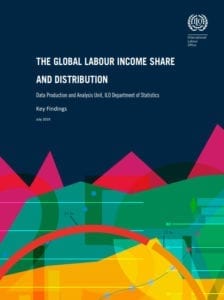 The report pushes back on the widely held view that overall income inequality is declining in the global south. Rather, increasing prosperity in China and India is skewing the data, which indicate pervasive income inequality in jobs around the world.
The report pushes back on the widely held view that overall income inequality is declining in the global south. Rather, increasing prosperity in China and India is skewing the data, which indicate pervasive income inequality in jobs around the world.
Overall, 10 percent of workers receive 48.9 percent of total global pay, while the lowest-paid 50 percent of workers receive just 6.4 percent, a new ILO dataset reveals, the ILO Labor Income Share and Distribution finds.
And the more top earners make, the less everyone else is paid, according to the report. But when income of middle- and lower-paid workers rises, everyone but the top earners gain.
The pay gap is especially large in struggling economies. In sub-Saharan Africa, the bottom 50 percent of workers earn only 3.3 percent of labor income, compared with the European Union, where the same group receives 22.9 percent of the total income.
“The majority of the global workforce endures strikingly low pay and for many having a job does not mean having enough to live on,” Gomis says.
Get Involved with Sustainable Development Campaign
The ILO data, requested by the ILO Global Commission on the Future of Work, will be used to monitor progress toward the United National Sustainable Development Goals (SDGs.) Representatives from around the world are set to meet this month for the High-Level Political Forum on some of the sustainable development goals, including SDG 8, which focuses on promoting sustained, inclusive and sustainable economic growth, full employment and decent work for all.
(The International Trade Union Confederation has launched a #Timefor8 campaign. Find out how you can take part.)
The ILO Labor Income Share and Distribution dataset includes 189 countries and provides the first internationally comparable figures of the share of GDP that goes to workers—rather than capital—through wages and earnings. It also looks at how labor income is distributed.
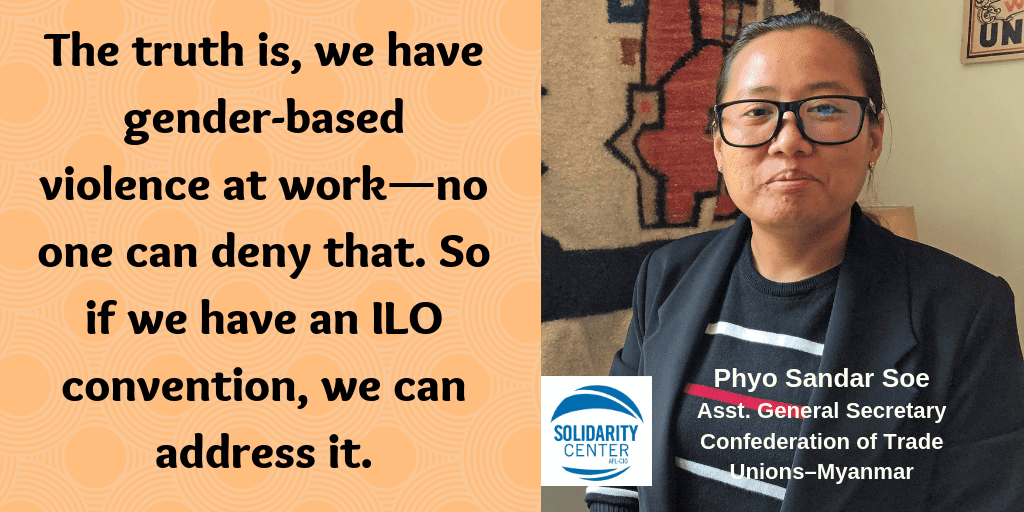
Jun 12, 2019
Workers and their unions are starting discussions this week on a global standard that would address violence and harassment in the world of work. They join representatives of employers and governments at the June 10–20 International Labor Conference (ILC) in Geneva, where they are championing an International Labor Organization (ILO) convention with a strong focus on gender-based violence (GBV) and harassment.
“We cannot deny that we have gender-based violence at work, so if we have an ILO convention, we can address it,” says Phyo Sandar So, assistant general secretary of the Confederation of Trade Unions–Myanmar (CTUM), a Solidarity Center partner. She says a global convention would enable union activists and their allies in countries like Myanmar to advocate for more protective laws and ensure their enforcement.
“We do not have a strong domestic law for violence at workplace,” she says. “When we make a policy for gender-based violence at work, we need to have international standards to make our own legislation, see how other countries implement it to make a law.” Sandar will be among workers at the ILC, where her CTUM union sisters will be at the negotiating table.
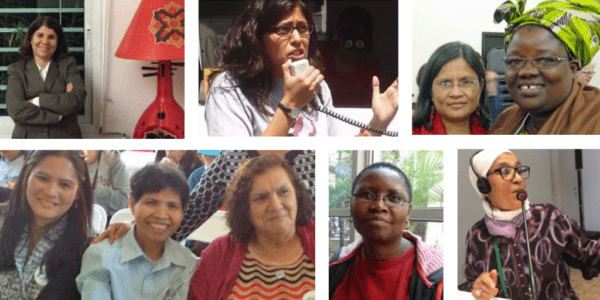
Among women union activists who have championed an end to GBV at work (from top, left): Tourya Lahrech; Alejandra Ancheita; Lily Gomes and Oretha Tarnue; May Joy Guarizo Salapare, Phobsuk Gasing and Myrtle Witbooi; Gertrude Mtsweni; and Saida Bentahar. Credit: Solidarity Center
Final negotiations on an ILO convention covering gender-based violence at work comes after more than a decade of work by women in the global labor movement. Women like Rose Omamo, general secretary of the Amalgamated Union of Kenya Metal Workers, a Solidarity Center partner.
“Women were going through serious sexual harassment at the workplace without knowing what to do about it. There were no gender champions who would campaign against GBV as compared to now that we are seriously campaigning against GBV at workplace,” she said.
In 2015, as a result of these efforts, the ILO agreed to craft a standard on ending violence and harassment against men and women in the world of work, and workers have been at the table helping shape it ever since. Their years-long effort has been supported by the International Trade Union Confederation, Solidarity Center and unions and organizations around the world.
Workers, Unions: Educating, Mobilizing for a GBV Standard
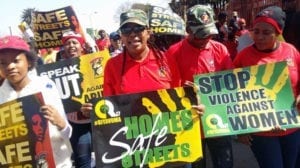
Members of COSATU were among union members across South Africa taking part in #TotalShutdown day last fall to protest violence against women. Credit: COSATU
In February 2019, the ILO released the most recent draft of the proposed convention, “Ending Violence and Harassment in the World of Work,” which builds on high-level discussions in spring 2018 among representatives of workers, government and business.
Leading up to the final discussions happening now in Geneva, Solidarity Center partners urged their unions, governments and employers to publicly support a binding ILO convention on violence and harassment at work that covers gender-based violence.
For instance, the Georgian Trade Unions Confederation (GTUC), together with other civil society organizations, helped push the adoption of a law that includes a definition of sexual harassment at the workplace, and designated the Public Defenders’ office as a state body responsible for the enforcement of new legislation.
“Trade unions in the Eastern European region have applied multiple approaches to secure support for the convention,” says Paata Beltadze, Solidarity Center regional gender specialist in Tbilisi.
“Unions increased awareness about the standard-setting procedures and importance of the convention to members; built alliances among civil society and human rights groups at the local and international levels; and organized regional workshop to share experiences, strategies and developing plans for a strong regional networking in the future,” says Beltadze.
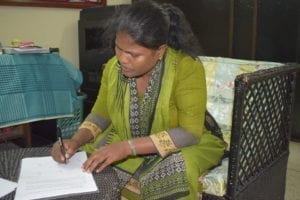
Sritee Akter from the Garment Workers Solidarity Federation in Bangladesh, signs a letter to the prime minister urging government support of an ILO convention on gender-based violence at work. Credit: Solidarity Center/Istiak Inam
In Bangladesh, trade union federations and worker organizations representing garment workers and domestic workers sent a message to the government urging the administration to support the convention. Nine Solidarity Center partner organizations signed a letter to Prime Minister Sheikh Hasina, making the case for government support for the convention and recommendations.
Omamo, a representative on the gender commission of the Organization of African Trade Union Unity (OATUU), and Gertrude Mtsweni, gender coordinator for the Congress of South African Trade Unions (COSATU), worked with OATUU’s gender commission to develop an effective message to urge their governments to ratify the convention after it is passed by the United Nations. Countries are not covered by a UN convention unless their governments ratify it and indicate they are committed to applying its provisions in national law and practice, and reporting on its application at regular intervals. COSATU activists took part in #TotalShutdown rallies last fall to protest violence against women.
These are just a sample of the education, mobilization and advocacy workers and their unions have undertaken in the weeks and months before the ILC.
“Unions today are uniquely positioned to enable workers to overcome workplace structures that perpetuate the skewed gender power relations at the root of much social and economic inequality,” says Robin Runge, Solidarity Center senior gender specialist.
“Unions provide a means by which working people most impacted by GBV can voice their needs and experiences. In doing so, unions have shown that when front-line workers have a say, solutions addressing deeply rooted problems like GBV effectively address the concerns for those most affected,” she says.
Resources
Two just-released informal surveys union members conducted among their co-workers at garment factories in Cambodia and Indonesia:
Op-ed by Robin Runge in Thomson Reuters
Solidarity Center video on gender-based violence at work:
Solidarity Center Legal review highlighting the need for an ILO convention on GBV.
Find out more about the ILC.












